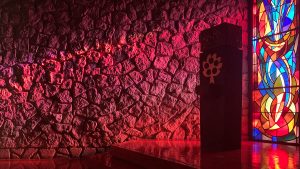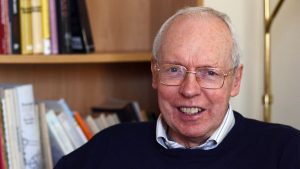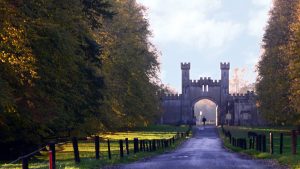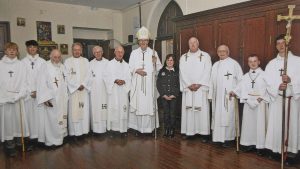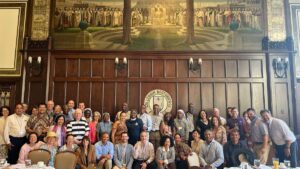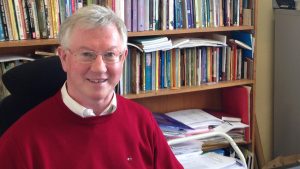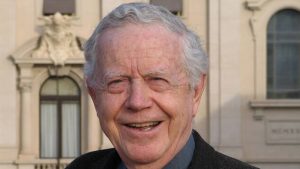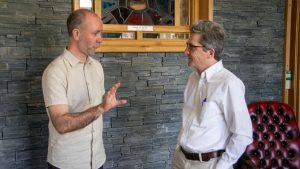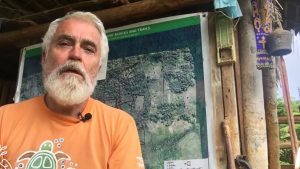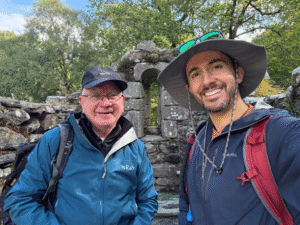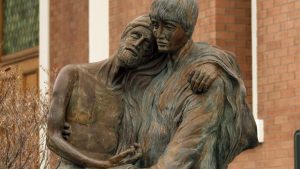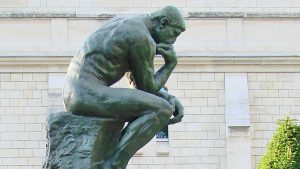Manchán Magan RIP: ‘Fear lán d’iontas’
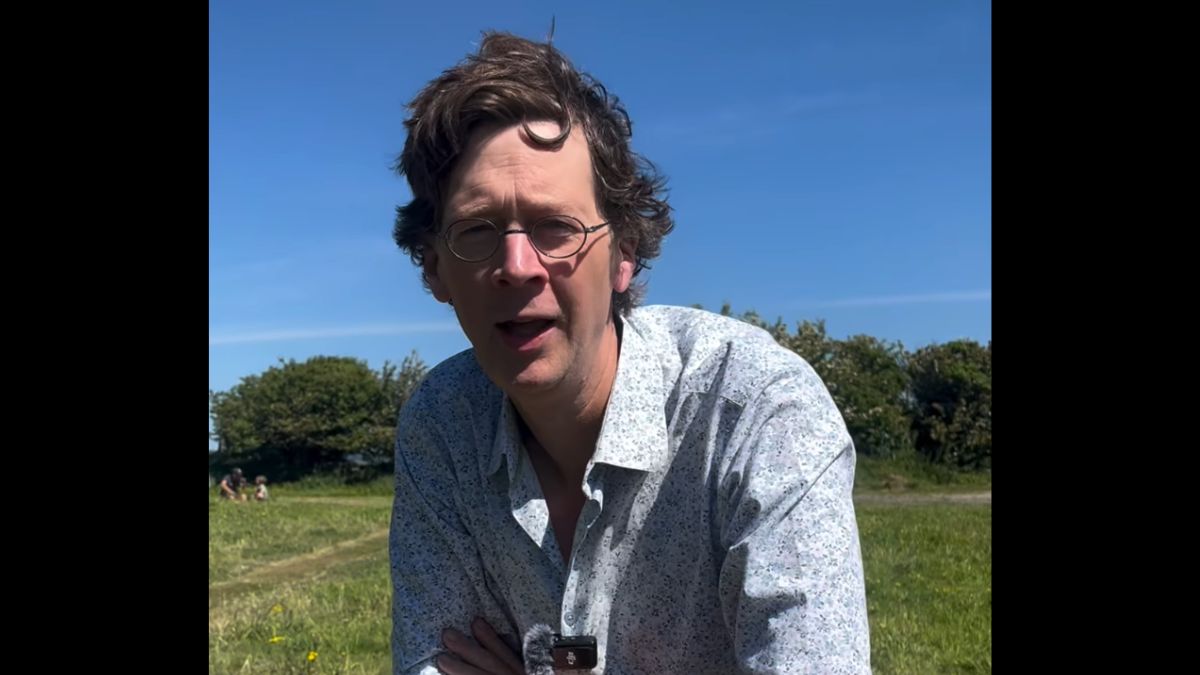
“Manchán was a prophet. Not one who foretells, but one who tells forth, who speaks the words of spirit into the world’s forgetting.” So said Tom Casey SJ, at the funeral service of the late Mánchan Magan » author, broadcaster, film maker, who died on Thursday 2 October 2025, aged 55. “And his message for our time?” he continued, “It is as simple, and as seismic, as this: If we do not walk the path of spirit, our footsteps will fade from the world.”
Manchán Magan was a former pupil of Gonzaga College SJ and it was in the school chapel that his wife, family, and friends gathered to say ‘goodbye’ on Monday 6 October. But his brother Ruán noted that “instead of being gone, Manchán is everywhere”. He said his “little brother” was a “fire starter, teacher, tree planter, builder, global inspiration – beautiful human.”
The much-loved Irish writer was known for his contributions to contemporary Irish literature, blending lyric prose with themes drawn from Irish history, folklore, and modern life. Through his work as a documentary film-maker he promoted the power of the Irish language by engaging with place, memory, and identity throughout the landscape and cultural history of Ireland. Addressing him directly his brother Ruán said “You taught us love… love of our fellow creatures and humans, love and respect for all cultures, love of language, spirit, laughter, words, imagination.”
Speaking at the service, his wife Aisling Rogerson said, “He used the Irish language to take us beyond language and culture.” And referencing his customary greeting “Hello to you,” she added said that he would “light up meeting someone for the first time and saying ‘hello to you ‘ as if he knew them forever, and the other person would just light up too.”
Aide-de-Camp Commandant Deirdre Newell represented the President of Ireland Michael D Higgins at the funeral. RTE Television news covered the service » with reporter Evelyn Ní Rourke noting the welcome for all who had gathered in the chapel. “Mourners were told by Fr Tom Casey that if he had 32 words for welcome, fáilte, he would have used them to the congregation.”
The service itself reflected the depth and the breadth of Manchán’s spirituality which embraced many faiths, and the traditions of indigenous people, especially the Celts. The offertory gifts included ‘only’ three of his dictionaries, a pair of his favourite sandals, a drum that had been gifted to him from his friends in the Native American community, and honey from his bees. It was, as one friend noted, “A funeral service the likes of which I have never been seen before nor am I likely to see again. The music, poetry, the symbols and the sharings… It was a pure spirit-filled celebration in gratitude for Manchán, for who he was and what he gave to us.”
“Manchán loved Ireland,” said Tom Casey, “But he loved the world also. He was fíor-Ghael i gcroí is i gcnámh, a true Irishman in heart and bone. But with the vision of one who saw the sacred in every tongue, every creature, and every dawn.” Read the full text of Tom’s address below.
Manchán Magan is survived by his wife Aisling, mother Cróine, brothers Ríoch and Ruán, and sister Líadain.
Ar dheis Dé go raibh a anam dílis.
‘Gatherer of light’
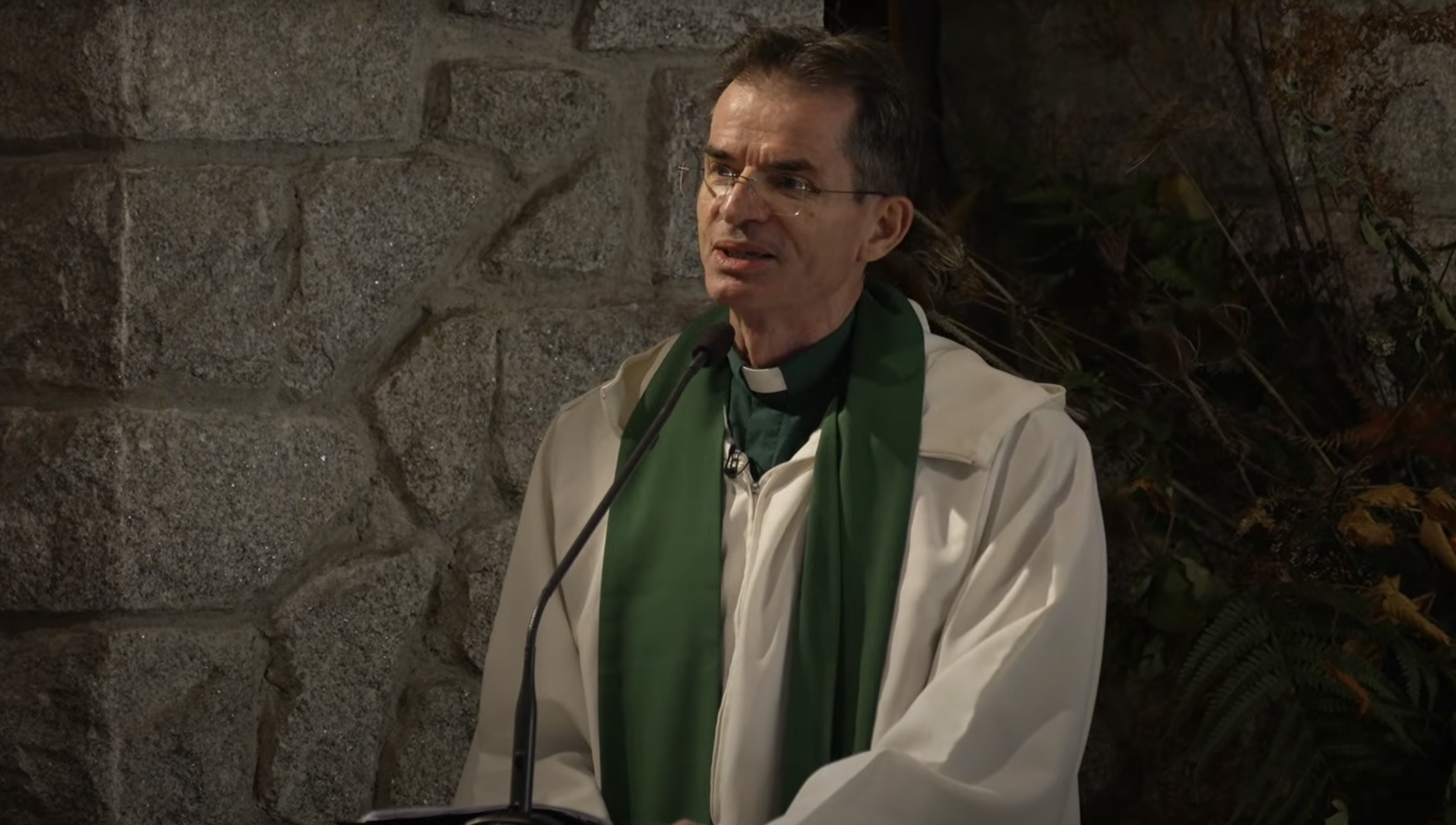
There is, they say, a Fifth Province in Ireland. And that’s what it’s called An Cúigiú Cúige: the Fifth Province. Not found on any map, but alive in the spirit of those who awaken to wonder. It is a province of soul, of silence, and of story, It is a realm that lies between the visible and the invisible, between the old language and the new world. And it is Manchán who has opened that Fifth Province for us. He pointed to a doorway we did not know was there: and invited us, gently, lovingly and laughingly, to step through.
Thug mé cuairt air tráthnóna Dé Luain seo caite. I visited him last Monday afternoon. Frail, yes, but bríomhar fós, still full of life. His brother Ruán whispered, “Speak to him in French.” So I did. And at the sound, he leapt, as though some spark from another world had caught fire in him again. We began a quiet duet. As he once wrote in Thirty-Two Words for a Field: “Different languages dance differently in the world.” And how he danced them! Irish, English, French: all were music to him, for he knew that language was not just an instrument for talking, but a path for walking through the world.
Manchán loved Ireland. But he loved the world also. He was fíor-Ghael i gcroí is i gcnámh, a true Irishman in heart and bone. But with the vision of one who saw the sacred in every tongue, every creature, and every dawn. He was a gatherer of light, drawing wisdom not just from parchment or archive, but from the living word, from ag éisteacht le guth agus le glór na talún, listening to the voice and the glory of the land itself. He listened to the whisper of bees, to the murmur of bog and oak, to the laughter of hens and the quiet knowing of pigs: sna coillte, sna beacha, sna cearca, sna muca. He lived in conversation with creation: ag comhrá leis an gcruthú féin.
He found wonder everywhere, sa teanga, sa scéal, sa phobal.: in language, in story, in community. He realized: tá gach rud ceangailte le chéile, everything is connected, soil and soul, body and belief, thought and thanksgiving.
He was a man full of wonder: fear lán d’iontas. He lived as the Kerry mystic John Moriarty once described: “Speechless, without grip: and what a wonder that is.” Gan ghreim, gan ghearán. Childlike, free, astonished. Leanbh mhór an nádúir, saor le hiontas.
For Manchán, every bush was a burning bush. To live astonished, maireachtáil le hiontas, this was his gift to us. He heard every created thing whispering, ag labhairt i dteanga an rúin: speaking in the language of mystery. Every day, a miracle: gach lá ina mhíorúilt.
He was a prophet. Not one who foretells, but one who tells forth, who speaks the words of spirit into the world’s forgetting. And his message for our time? It is as simple, and as seismic, as this: If we do not walk the path of spirit, our footsteps will fade from the world. Muna siúlfaimid slí an spioraid, imeoidh ár lorg ón domhan. Without spirit, there is no future for humankind. Gan anam, níl aon todhchaí.
Manchán was both rooted and roaming. He travelled widely, yet his heart was earthed in 10 acres of Westmeath, in that ancient middle ground where the provinces once met. And so, fittingly, he has reawakened for us an Cúigiú Cúige, the Fifth Province. In Irish, we call a province a Cúige, a word that comes from cúigiú, meaning fifth. And yet as every schoolchild learns, there are only four: Leinster, Munster, Connacht, and Ulster. All of Ireland is already taken up, there’s no room left for another province. But still the word whispers of a fifth, of a cúigiú cúige, a province beyond the map.
Where is this 5th Province? It lies in the realm of the heart, the place of spirit and imagination. It is the province that cannot be conquered or divided; it is the Ireland of the soul. It is a Province where the Irish tongue rises again, ina n-éiríonn an Ghaeilge arís, not only in word, but in way. A way shaped by 32 words for field, and 99 for rain (as well as one for sun!) A way shaped by story and silence, by wonder and by belonging. It is a Province of breathing, not boundaries.
And it is this 5th Province that Manchán has helped us to believe in. Through his life, his words, and his courage, he has reminded us that Ireland is more than the sum of its fields and counties, more than its histories and heartbreaks. Manchán has shown us that the 5th Province is alive, and that we may enter it not by road or rail (with all due respects to the series “Europe by Train”!), but by kindness, by vision, and by faith.
So, let’s live as he lived: le lúcháir, le hiontas, le spiorad beo, and éistimis to the whisper of the world again. And if we reflect on his example, le cúnamh Dé, we too may come to see that every bush is a burning bush. We too may come to have a felt and vivid sense of God’s presence all around us. We too may end up believing in that hidden Ireland, and rejoice in it, as he did.
A.M.D.G.
Tom Casey SJ
Funeral Service: Manchán Magan.
Monday 6 Oct 2025


